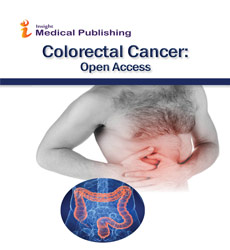Abstract
The Prospect of Using Serum Taurine Level as a Potential Biomarker for Early Detection of Colorectal Carcinoma and Its Correlation with Other Prognostic Markers
Background: Colorectal carcinoma is the third leading cause of cancer-related deaths in the USA, resulting in an estimated of more than 49,000 deaths in 2016 and estimated 1.4 million cases and 693,900 deaths occurring in 2012 worldwide. In Egypt, it remains a heavy problem as about 40% of cases occur in individuals under 40 years of age. Current studies have proposed that changes in systemic taurine levels can be used to predict the formation and malignant transformation of certain tumors. Also, recent studies shown that it can be used as early biomarker in breast cancer, uterus cancer, diabetic retinopathy, liver fibrosis and hepatocellular carcinoma. Aim: Investigate the probability of using serum taurine level as a pre- early biomarker for Colorectal carcinoma especially in pre-cancerous condition in Egyptian patients and comparing between serum taurine level and specific biomarkers before and after surgical treatment. Patients and methods: From a lot of Egyptian patients attended to National Cancer Institute, Cairo University, presented with abdominal troubles and gastrointestinal problems after full examination and diagnosis, 106 patients -after their approval- were classified into three groups: The first group consists of ninety-one patients were diagnosed with colorectal carcinoma with various stages, The second group is involving eight patients were diagnosed as benign tumors and The third group including only seven patients were diagnosed with inflammatory diseases. Ten health volunteers were enrolled as a frank control. For first group and second group serum taurine measured preoperatively (day before operation) and postoperatively (after 45 days from operation). Results: While, CEA and CA19.9 showed highly significant differences in all groups comparing with control group but still clinically- for inflammatory group and benign tumor group- within normal ranges. Serum taurine level showed highly significant changes between CRC group, benign group, inflammatory group and control group, as in CRC group taurine level dropped by approximately 77.5% (13.6 ± 1.9 µmol/L) below normal in control group (60.6 ± 6.7 µmol/L) moreover, lowered by ≈ 61% (23.4 ± 2.6 µmol/L) in benign group compared by control group and for inflammatory group; its level decreased by 50% (34.8 ± 2.7 µmol/L) compared to control. Conclusion: Serum taurine results in our study showed that, besides CRC biomarkers; it is most attractive, more precious and more accurate early biomarker for early detecting of any malignant change which may led to CRC by other mean it is the most sensitive and more specific tumor marker for CRC. As a result, we can recommend measuring its level regularly with other prognostic tumor biomarkers and screening examination for all people with abdominal and gastrointestinal problems and for precancerous patients as a pre-early biomarker for colorectal carcinoma. So, it needs further studies to confirm that observations on large scale of population as it obvious the small sample size in early stage and lack data due to limited financial resources and it needs more efforts to collect first and precancerous stages patients.
Author(s):
Amira El-Hakim H, El-Agouza M, El-Shimy RA, Mohammed HG and El-Gendy HAA
Abstract | PDF
Share this

Google scholar citation report
Citations : 92
Colorectal Cancer: Open Access received 92 citations as per google scholar report
Abstracted/Indexed in
- Google Scholar
- JournalTOCs
- China National Knowledge Infrastructure (CNKI)
- Directory of Research Journal Indexing (DRJI)
- WorldCat
- Publons
- International Committee of Medical Journal Editors (ICMJE)
- Secret Search Engine Labs
Open Access Journals
- Aquaculture & Veterinary Science
- Chemistry & Chemical Sciences
- Clinical Sciences
- Engineering
- General Science
- Genetics & Molecular Biology
- Health Care & Nursing
- Immunology & Microbiology
- Materials Science
- Mathematics & Physics
- Medical Sciences
- Neurology & Psychiatry
- Oncology & Cancer Science
- Pharmaceutical Sciences

